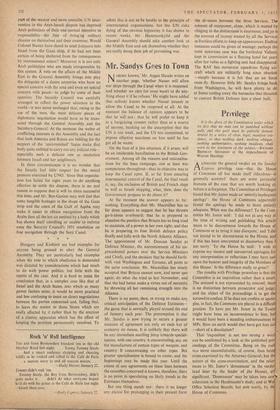Mr. Sandys Goes to Town
OBODY knows,' Mr. Angus Maude writes on • N another page, 'whether Nasser will allow our ships through the Canal when it is reopened.
and whether we care (or even want) to do any- thing about it if he refuses.' He might have added that nobody knows whether Nasser intends to allow the Canal to be reopened at all. At the as a bargaining counter rather than as a source of income, banking on the assumption that the UN is too weak, and the US too committed, to impose effective sanctions on him until he has got all he wants.
On the face of it this situation, if it arises, will be an intolerable humiliation to the British Gov- ernment. Among all the reasons and rationalisa- tions for the Suez campaign, one at least was conspicuous throughout—that its objective was to keep the Canal open. If, so far from ensuring international control of the Canal, the final result is, say, the exclusion of British and French ships as well as Israeli shipping, what, then, does the Government propose to do about it?
At the moment the answer appears to be: nothing. Everything that Mr. Macmillan has so far done appears to suggest that he has thrown go-it-alone overboard: that he is prepared to abandon the position that Britain has so long tried to maintain, of a power in her own right; and that he is preparing to fuse British defence policy finally and fully with the North Atlantic Alliance. The appointment of Mr. Duncan Sandys as Defence Minister, the announcement of his un- precedented powers over the Service Ministers- and Chiefs, and the decision that he should forth- with visit Washington and Toronto, all point to the same conclusion. Mr. Macmillan has wisely accepted that Britain cannot now, and never rsan again, do what she tried to last November; and that she had better make a virtue out of necessity by throwing all her remaining strength into the Alliance.
There is no point, then, in trying to make any critical anticipation of the Defence Estimates— the game that is normally played around the end of January each year. The presumption is that Mr. Sandys is now trying to secure a greater measure of agreement not only on ends but of economy on means. It is unlikely that there will be any immediate startling jump towards special- isation, with one country A concentrating, say. on the manufacture of certain types of weapon, and country B concentrating on other types. But greater specialisation is bound to come; and the beginnings may be made this year. Until the extent of any agreements on these lines between the countries concerned is known, therefore, there is no point in speculating on likely trends in the Estimates themselves.
But one thing stands out : there is no longer any excuse for prolonging in their present form the divisions between the three Services. The amount of manpower, alone, which is wasted by clinging to the distinctions is enormous; and ,so is the amount of money wasted, by all the Services in fruitless efforts to keep up appearances. Endless instances could be given of wastage; perhaps the most notorious case was the battleship Valiant, kept in commission as a floating hotel for years after her value as a fighting unit had disappeared. The RAF has numerous squadrons flying air- craft which are militarily long since obsolete —simply, because it is felt that an air force must fly. However little Mr. Sandys brings back from Washington, he will have plenty to do at home cutting away the barnacles that threaten to convert British Defence into a sheer hulk.


































 Previous page
Previous page